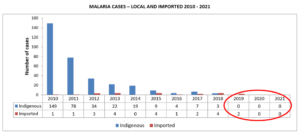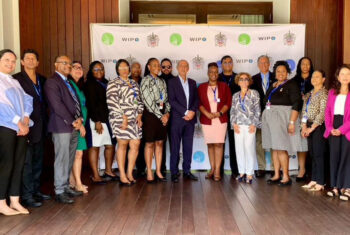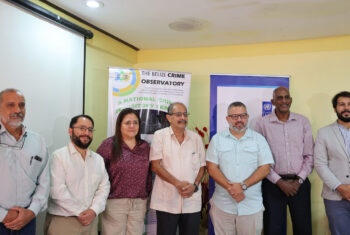Belize remains steadfast to be certified as a malaria-free country
Belmopan. November 5, 2021. 4:15 p.m.
World Malaria Day will be observed on November 6, 2021, under the theme “Reaching the zero malaria target,” a strategic advocacy and communications campaign that aims to keep malaria high on the political agenda and increase advocacy and commitment among stakeholders in an effort to draw communities into action.
In 2019, there were an estimated 229 million cases of malaria and 409,000 malaria-related deaths in 87 countries. Following a sustained trend toward the reduction of malaria from 2005 to 2014, the region of the Americas has experienced an increase in the total number of cases and deaths since 2015. This is mainly an effect of the massive increase in transmission and outbreaks in areas with complex socio-political and economic challenges and, recently, compounded by other challenges brought about by the COVID-19 pandemic. Much like the global trend, progress on the achievement of target reductions in malaria burden has stalled since 2015. In 2019, the region reported a total of 816,000 cases and 197 deaths, compared to 453,000 cases and 159 deaths in 2015.
Regionally, Belize has made significant advancements towards the malaria-specific target of the Sustainable Development Goals (target 3.3), which calls for ending malaria worldwide by 2030. Belize has achieved a significant decrease in the number of reported malaria cases since 2000, from 1,486 cases to zero local cases in 2019, 2020, and thus far in 2021. Belize is now part of the E-2025 World Health Organization (WHO) initiative ─ a select group of countries with the potential of eliminating malaria by 2025. A key part of the malaria-free certification process by WHO requires countries to maintain three consecutive years of zero local cases; Belize is on its way to achieving this monumental status having had 34 consecutive months without a local case.

In the lead-up to this year’s Malaria Day in the Americas, countries across the globe are responding to the COVID-19 pandemic. The Ministry of Health & Wellness underscores the critical importance of sustaining efforts to prevent, detect and treat malaria. The ministry expresses sincere appreciation to the network of Malaria Voluntary Collaborators and community health workers and the vector control program countrywide who have been instrumental in the success of their efforts. The ministry calls on local healthcare workers to increase the surveillance for malaria and to engage stakeholders in aggressively fighting malaria.
Ends


